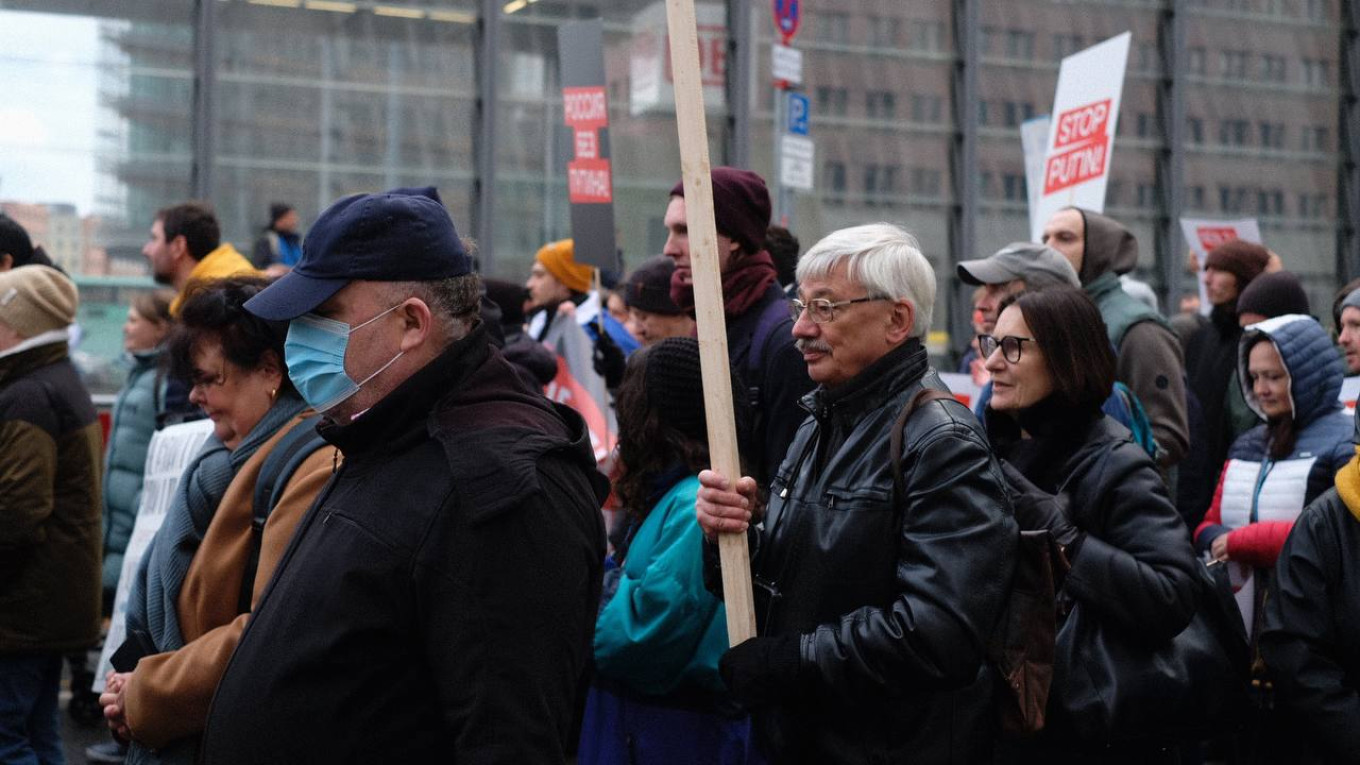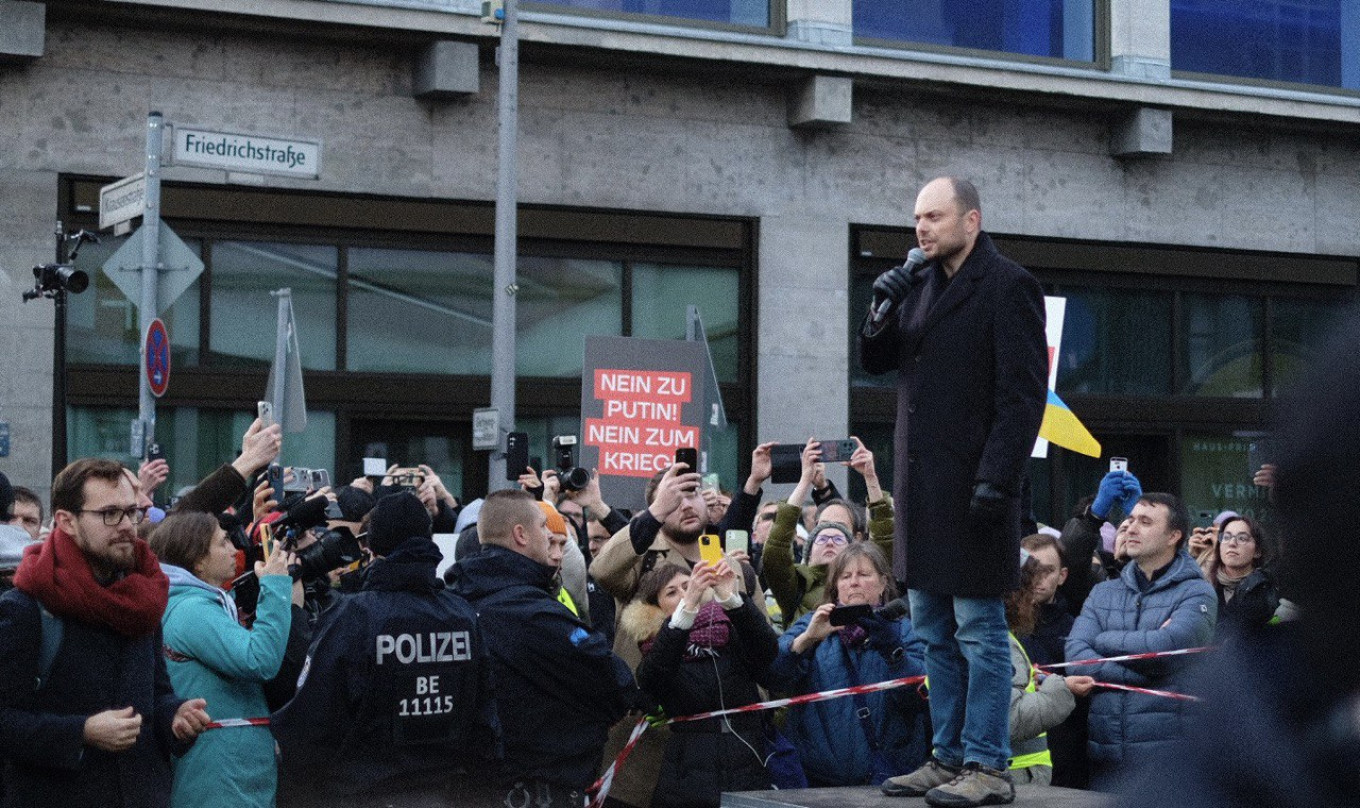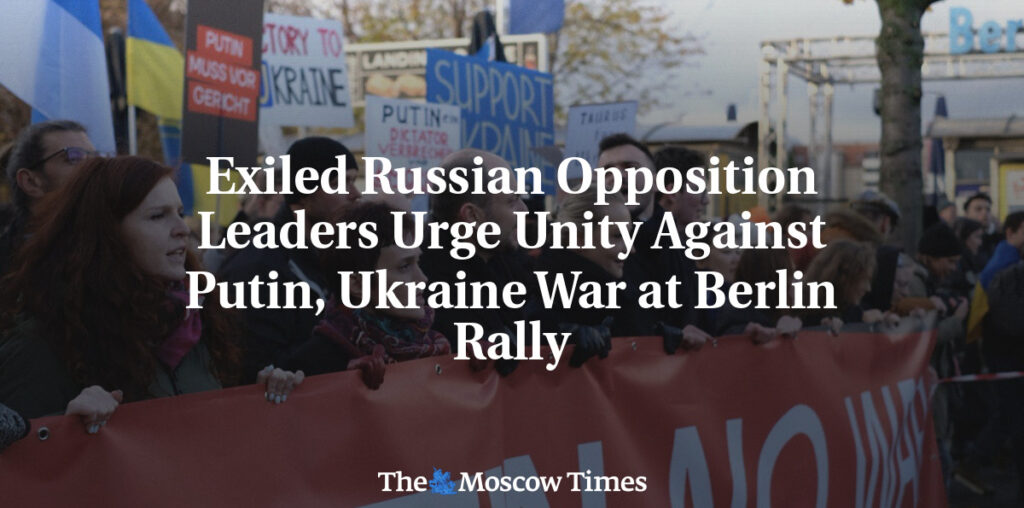BERLIN – Nearly three years after Russia invaded Ukraine, can another anti-war march in Europe change the political landscape in Russia?
Russian opposition figures argue that it can.
Yulia Navalnaya, the widow of late opposition leader Alexei Navalny, as well as prominent politicians Ilya Yashin and Vladimir Kara-Murza, called on their supporters to rally in Berlin on Sunday ahead of the 1,000th day of the war.
While critics of the Russian opposition argue that its disunity weakens its impact and that protesting in Europe is unlikely to change the situation in Russia, the protest’s leaders insist that such demonstrations remain crucial.
“Nothing energizes people like having a lot of like-minded individuals around,” Yashin told The Moscow Times in an interview ahead of the protest.
“We decided to formulate a few theses around which we can rally a lot of people. We succinctly and clearly formulated our political demands: the withdrawal of troops from Ukraine, the resignation of Vladimir Putin and his trial as a war criminal and the release of political prisoners,” Yashin said.
It appears that many Russians living in Europe share this view, with protesters gathering in European capitals like London, Amsterdam, Vilnius, Lisbon and Vienna in solidarity with the Berlin rally.
In Berlin, between 2,000 to 4,000 Russian expats marched through the city center from Henriette Herz Park to the Russian embassy, chanting slogans like “No to Putin!” and “No to war!”
“I feel it’s absolutely necessary to come and show with my participation that not everyone supports Putin. There are people who are against the war, against Putin and against his dictatorship,” said Vladimir, who came to Berlin from Dresden to join the protest.
“We all want to live in a future Russia without Putin,” Vladimir told The Moscow Times.
Navalnaya, who took up her late husband’s mission following his death in a Russian penal colony in February, spoke at the protest about Navalny and reiterated that she blames the Kremlin for his death.
“We must take the place [of slain opposition figures] and continue to fight,” she told the crowd.
The protest marked a significant milestone for Yashin and Kara-Murza, who themselves were political prisoners in Russia before their release on Aug. 1 as part of a high-stakes prisoner exchange between Moscow and the West.
Veteran human rights defender Oleg Orlov, another of the 16 prisoners freed by Russia in the prisoner swap, underscored the rally’s significance in light of the growing influence in Europe of right-wing movements that have traditionally taken a friendlier stance toward Putin.
“The sentiments I have observed in Europe since being released and arriving here are concerning. Far too many people, it turns out, are willing to appease the aggressor at any cost. This is extremely dangerous,” Orlov told The Moscow Times at the demonstration.
“I believe today’s event, which unequivocally opposes the appeasement of the aggressor and stands against the war — demanding the full withdrawal of Russian troops from Ukraine’s occupied territories — is a significant moment,” Orlov said.
Activists from the Feminist Anti-War Resistance (FAR) movement and the Vesna democratic youth organization encouraged protesters to carry placards bearing messages from Russians inside Russia who are silenced by the Kremlin’s repressive laws.

Moscow Times reporter
Vesna also handed out leaflets urging assistance for Russian military deserters to protesters.
“This group [deserters] is in a very vulnerable position. Many of them are stranded without documents in countries like Armenia and Kazakhstan. They are occasionally abducted and, unfortunately, significant support from European authorities is now required to relocate them to safe countries and provide asylum,” Vesna coordinator Milana Shesterikova told The Moscow Times.
The march took place amid ongoing debates about the future of Russian opposition politics in exile as the movement remains plagued by infighting and grapples with limited means of making its message heard inside Russia.
Kremlin spokesman Dmitry Peskov dismissed the opposition figures ahead of Sunday’s protest, labeling them “completely detached” from the reality inside Russia and claimed their views held “no interest” for Russians.

Moscow Times reporter
But at the rally, the trio of opposition figures aimed to show a united front and inspire others to stand together against the war and Putin.
“The full-scale war has been ongoing for almost three years now…Every day in Ukraine, civilians are killed, children lose their homes and hospitals and schools are destroyed. All of this is carried out by Putin’s regime in the name of our once-proud country, under the Russian flag and on behalf of the entire Russian society,” Kara-Murza told the demonstrators.
“Dictators are especially fond of claiming — and pretending — that they have the full support of the population,” he said.
“The Kremlin’s propaganda does everything it can to convince the world that all Russian citizens support this criminal, aggressive war,” he continued.
“But is this true?”
A Message from The Moscow Times:
Dear readers,
We are facing unprecedented challenges. Russia’s Prosecutor General’s Office has designated The Moscow Times as an “undesirable” organization, criminalizing our work and putting our staff at risk of prosecution. This follows our earlier unjust labeling as a “foreign agent.”
These actions are direct attempts to silence independent journalism in Russia. The authorities claim our work “discredits the decisions of the Russian leadership.” We see things differently: we strive to provide accurate, unbiased reporting on Russia.
We, the journalists of The Moscow Times, refuse to be silenced. But to continue our work, we need your help.
Your support, no matter how small, makes a world of difference. If you can, please support us monthly starting from just $2. It’s quick to set up, and every contribution makes a significant impact.
By supporting The Moscow Times, you’re defending open, independent journalism in the face of repression. Thank you for standing with us.
Continue
Not ready to support today?
Remind me later.
×
Remind me next month
Thank you! Your reminder is set.

